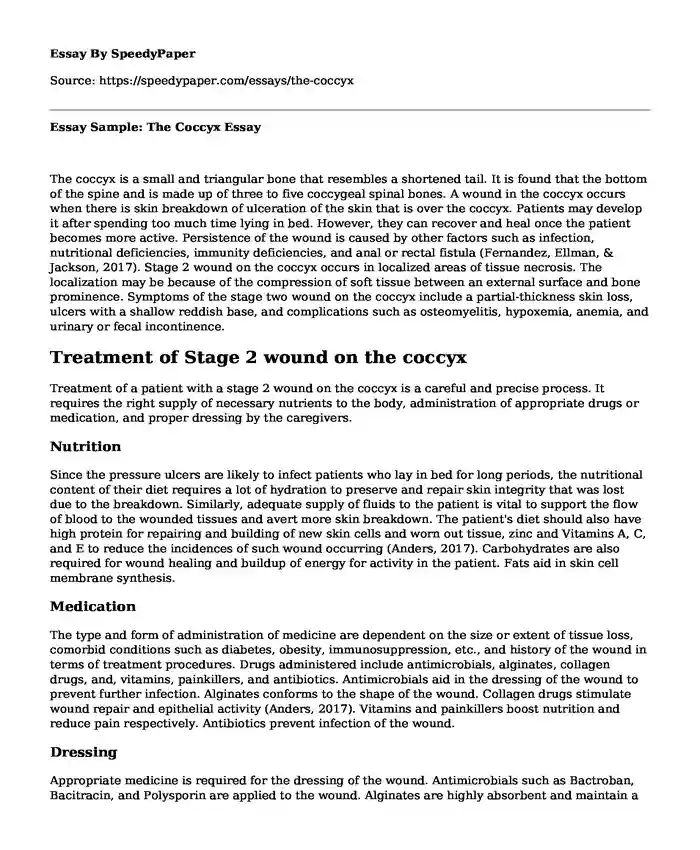The coccyx is a small and triangular bone that resembles a shortened tail. It is found that the bottom of the spine and is made up of three to five coccygeal spinal bones. A wound in the coccyx occurs when there is skin breakdown of ulceration of the skin that is over the coccyx. Patients may develop it after spending too much time lying in bed. However, they can recover and heal once the patient becomes more active. Persistence of the wound is caused by other factors such as infection, nutritional deficiencies, immunity deficiencies, and anal or rectal fistula (Fernandez, Ellman, & Jackson, 2017). Stage 2 wound on the coccyx occurs in localized areas of tissue necrosis. The localization may be because of the compression of soft tissue between an external surface and bone prominence. Symptoms of the stage two wound on the coccyx include a partial-thickness skin loss, ulcers with a shallow reddish base, and complications such as osteomyelitis, hypoxemia, anemia, and urinary or fecal incontinence.
Treatment of Stage 2 wound on the coccyx
Treatment of a patient with a stage 2 wound on the coccyx is a careful and precise process. It requires the right supply of necessary nutrients to the body, administration of appropriate drugs or medication, and proper dressing by the caregivers.
Nutrition
Since the pressure ulcers are likely to infect patients who lay in bed for long periods, the nutritional content of their diet requires a lot of hydration to preserve and repair skin integrity that was lost due to the breakdown. Similarly, adequate supply of fluids to the patient is vital to support the flow of blood to the wounded tissues and avert more skin breakdown. The patient's diet should also have high protein for repairing and building of new skin cells and worn out tissue, zinc and Vitamins A, C, and E to reduce the incidences of such wound occurring (Anders, 2017). Carbohydrates are also required for wound healing and buildup of energy for activity in the patient. Fats aid in skin cell membrane synthesis.
Medication
The type and form of administration of medicine are dependent on the size or extent of tissue loss, comorbid conditions such as diabetes, obesity, immunosuppression, etc., and history of the wound in terms of treatment procedures. Drugs administered include antimicrobials, alginates, collagen drugs, and, vitamins, painkillers, and antibiotics. Antimicrobials aid in the dressing of the wound to prevent further infection. Alginates conforms to the shape of the wound. Collagen drugs stimulate wound repair and epithelial activity (Anders, 2017). Vitamins and painkillers boost nutrition and reduce pain respectively. Antibiotics prevent infection of the wound.
Dressing
Appropriate medicine is required for the dressing of the wound. Antimicrobials such as Bactroban, Bacitracin, and Polysporin are applied to the wound. Alginates are highly absorbent and maintain a moist environment around the wound for healing purposes. Barriers such as pastes and powders protect the injury from the external environment (Fernandez, Ellman, & Jackson, 2017). Compression wraps and foams reduce the maceration of peri-wound tissue. Hydrocolloid maintains moist wound surface and is mildly absorbent. Use of hydro fibers with secondary dressing is required to keep the wound of external environment impurities (Fernandez, Ellman, & Jackson, 2017). Application of hydrogels such as Intrasite and Vigilon is necessary to increase moisture content and produce a soothing effect on the patient. The use of Sodium Chloride impregnated dressings is vital to promote mechanical and autolytic debridement and discourage bacterial proliferation.
References
Anders, T. (2017). Management of a patient with a coccyx ulcer in a nursing home. Wounds UK .
Fernandez, L., Ellman, C., & Jackson, P. (2017). Initial experience using an novel reticulated open cell foam dressing with through holes during negative pressure wound therapy with instillation for management of pressure ulcers. J Trauma Treat , 410.
Cite this page
Essay Sample: The Coccyx. (2022, Dec 07). Retrieved from https://speedypaper.com/essays/the-coccyx
Request Removal
If you are the original author of this essay and no longer wish to have it published on the SpeedyPaper website, please click below to request its removal:
- Intangible Drilling Costs Essay
- Reflection Paper Example
- Free Essay Example on Fibromyalgia
- Rationale Essay for a Degree Program in Business Management and Economics
- Legal and Ethical Responsibilities of Nurses, Free Essay Example
- Free Essay Example - Auguste Renoir
- Essay Sample on Unethical and Disruptive Behavior
Popular categories





